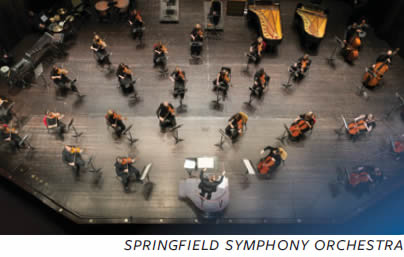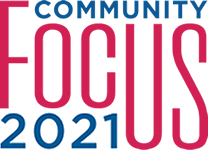 SOCIAL & COMMUNITY CONTEXT
SOCIAL & COMMUNITY CONTEXT
Understanding the social and community context is critical to evaluating community health.
Connecting points within Springfield and Greene County—such as those found in our arts community—are important contributors to strengthening social bonds necessary to drive civic participation. And prior to the communitywide shutdown in March 2020, arts and culture organizations were reporting strong audience engagement. New programs, returning favorites and more complex projects all spurred a sustained growth in attendance and ticket sales and momentum that officials hope can be regained once the pandemic is over.
The impact of the prolonged shutdown and capacity limitations during the pandemic will be felt for years to come in the arts and culture community. Attendance rates across the arts and culture community dropped 52%. Along with the disappearance of ticket sales, most organizations also canceled fundraising events and galas—which are especially important as arts organizations face chronic funding challenges, with or without a pandemic.

The arts and culture community shifted to virtual delivery as the pandemic took hold in 2020. New facilities did open, including the Springfield Little Theatre's Judith Enyeart Reynolds School for the Performing Arts. And though the pandemic limited interactions, citizens of Springfield and Greene County continued to build social capital in the community through volunteerism and support of local organizations, nonprofit collaborations, voter activity and civic input on important local issues.
There were successes, such as the new Volunteer Leadership of the Ozarks group, a collection of nonprofit volunteer managers from various organizations that meet quarterly to compare best practices. Leadership Springfield also continued to provide many volunteer opportunities through its training curriculum.
Nonprofit leaders are optimistic that volunteerism will meet or exceed pre-pandemic levels once people feel it is safe to help in person. United Way has also been working on ways to help people understand how local government and community organizations work to build trust and help citizens feel more engaged.
The area's sizable faith community contributes to strong community engagement through collaborations with nonprofits and with the Council of Churches of the Ozarks, an ecumenical organization that includes 72 member churches and more than 4,000 active supporters. According to its 2020 annual report, volunteers and programs served more than 81,200 people across 49 Missouri counties.
Increased voting services and strong collaborative education efforts encouraged voter engagement. To help educate voters prior to the November 2020 election, members of the League of Women Voters distributed 20,000 voting guides to more than 250 locations in Greene, Christian and Webster counties. The League also extended its Vote411.org online registration option to the primary as well as the general election and conducted more than 50 voter registration drives, including several with the Springfield- Greene County Library District.
Despite these efforts, low voter turnout continues to be a challenge. Greene County's adult population is estimated at 237,000, yet only 168,458—about 71%—were actively registered for the November 2020 election. Among those registered as active voters, meaning the address of the voter is current, 85% turned out in person or by absentee ballot to cast a vote during the pandemic. That means nearly 40% of Greene County adults did not vote.
It's important to increase public awareness about updating addresses in voter records after a move within the county, or risk becoming an inactive voter, a status that continues to be an issue. An inactive voter is so defined if mail is returned from an address and the voter, after direct follow-up from the Greene County Clerk's office, does not update their address of record after 30 days in the voter registration file.
Community leaders express concern about the impact of misinformation and divisive discourse on community engagement. This concern applies especially to confidence in election integrity and to community health related to the COVID-19 pandemic. Widely shared misinformation about COVID-19 via Facebook and other social media platforms has led to public divides over masking and vaccination requirements, even as trusted local sources have continued to share science-based information to help citizens make informed decisions.
Related to this issue is the decline in locally owned media. The few reporters left in local newsrooms are expected to cover wide swaths of the area with little time to specialize in or provide regular coverage of niches such as the arts sector.
Strides have been made to improve diversity and inclusion in the arts and culture community, but a great deal more must be done to address this Red Flag identified in the 2019 Community Focus Report.


